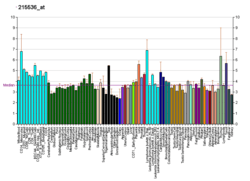HLA-DQB2
HLA class II histocompatibility antigen, DX beta chain is a protein that in humans is encoded by the HLA-DQB2 gene.[3][4]
References
- ENSG00000196610, ENSG00000228254, ENSG00000232629, ENSG00000229493, ENSG00000228813, ENSG00000226165, ENSG00000224305 GRCh38: Ensembl release 89: ENSG00000230675, ENSG00000196610, ENSG00000228254, ENSG00000232629, ENSG00000229493, ENSG00000228813, ENSG00000226165, ENSG00000224305 - Ensembl, May 2017
- "Human PubMed Reference:". National Center for Biotechnology Information, U.S. National Library of Medicine.
- Berdoz J, Tiercy JM, Rollini P, Mach B, Gorski J (May 1989). "Remarkable sequence conservation of the HLA-DQB2 locus (DX beta) within the highly polymorphic DQ subregion of the human MHC". Immunogenetics. 29 (4): 241–8. doi:10.1007/BF00717908. PMID 2564844.
- "Entrez Gene: HLA-DQB2 major histocompatibility complex, class II, DQ beta 2".
Further reading
- Piatier-Tonneau D, Gastinel LN, Amblard F, et al. (1991). "Interaction of CD4 with HLA class II antigens and HIV gp120". Immunogenetics. 34 (2): 121–8. doi:10.1007/BF00211424. PMID 1869305.
- Rosenstein Y, Burakoff SJ, Herrmann SH (1990). "HIV-gp120 can block CD4-class II MHC-mediated adhesion". J. Immunol. 144 (2): 526–31. PMID 1967269.
- Bowman MR, MacFerrin KD, Schreiber SL, Burakoff SJ (1991). "Identification and structural analysis of residues in the V1 region of CD4 involved in interaction with human immunodeficiency virus envelope glycoprotein gp120 and class II major histocompatibility complex molecules". Proc. Natl. Acad. Sci. U.S.A. 87 (22): 9052–6. doi:10.1073/pnas.87.22.9052. PMC 55099. PMID 1978941.
- Clayton LK, Sieh M, Pious DA, Reinherz EL (1989). "Identification of human CD4 residues affecting class II MHC versus HIV-1 gp120 binding". Nature. 339 (6225): 548–51. doi:10.1038/339548a0. PMID 2543930.
- Diamond DC, Sleckman BP, Gregory T, et al. (1988). "Inhibition of CD4+ T cell function by the HIV envelope protein, gp120". J. Immunol. 141 (11): 3715–7. PMID 2846691.
- Jonsson AK, Hyldig-Nielsen JJ, Servenius B, et al. (1987). "Class II genes of the human major histocompatibility complex. Comparisons of the DQ and DX alpha and beta genes". J. Biol. Chem. 262 (18): 8767–77. PMID 3036828.
- Andrieu JM, Even P, Venet A (1986). "AIDS and related syndromes as a viral-induced autoimmune disease of the immune system: an anti-MHC II disorder. Therapeutic implications". AIDS Research. 2 (3): 163–74. doi:10.1089/aid.1.1986.2.163. PMID 3489470.
- Okada K, Boss JM, Prentice H, et al. (1985). "Gene organization of DC and DX subregions of the human major histocompatibility complex". Proc. Natl. Acad. Sci. U.S.A. 82 (10): 3410–4. doi:10.1073/pnas.82.10.3410. PMC 397785. PMID 3858830.
- Houlgatte R, Scarmato P, el Marhomy S, et al. (1994). "HLA class II antigens and the HIV envelope glycoprotein gp120 bind to the same face of CD4". J. Immunol. 152 (9): 4475–88. PMID 7512597.
- Chirmule N, McCloskey TW, Hu R, et al. (1995). "HIV gp120 inhibits T cell activation by interfering with expression of costimulatory molecules CD40 ligand and CD80 (B71)". J. Immunol. 155 (2): 917–24. PMID 7541827.
- Rowell JF, Stanhope PE, Siliciano RF (1995). "Endocytosis of endogenously synthesized HIV-1 envelope protein. Mechanism and role in processing for association with class II MHC". J. Immunol. 155 (1): 473–88. PMID 7602119.
- Chen YH, Böck G, Vornhagen R, et al. (1994). "HIV-1 gp41 binding proteins and antibodies to gp41 could inhibit enhancement of human Raji cell MHC class I and II expression by gp41". Mol. Immunol. 31 (13): 977–82. doi:10.1016/0161-5890(94)90092-2. PMID 8084338.
- Chirmule N, Wang XP, Hu R, et al. (1994). "Envelope glycoproteins of HIV-1 interfere with T-cell-dependent B cell differentiation: role of CD4-MHC class II interaction in the effector phase of T cell help". Cell. Immunol. 155 (1): 169–82. doi:10.1006/cimm.1994.1110. PMID 8168144.
- Callahan KM, Rowell JF, Soloski MJ, et al. (1993). "HIV-1 envelope protein is expressed on the surface of infected cells before its processing and presentation to class II-restricted T lymphocytes". J. Immunol. 151 (6): 2928–42. PMID 8376762.
- Beck S, Abdulla S, Alderton RP, et al. (1996). "Evolutionary dynamics of non-coding sequences within the class II region of the human MHC". J. Mol. Biol. 255 (1): 1–13. doi:10.1006/jmbi.1996.0001. PMID 8568858.
- Ruff AL, Guarnieri FG, Staveley-O'Carroll K, et al. (1997). "The enhanced immune response to the HIV gp160/LAMP chimeric gene product targeted to the lysosome membrane protein trafficking pathway". J. Biol. Chem. 272 (13): 8671–8. doi:10.1074/jbc.272.13.8671. PMID 9079699.
- Hsu SH, Robbins FM, Modelo RB, et al. (1998). "Identification of a new DQB1*0613 allele in a family". Tissue Antigens. 50 (6): 685–7. doi:10.1111/j.1399-0039.1997.tb02935.x. PMID 9458130.
- Kanazawa S, Okamoto T, Peterlin BM (2000). "Tat competes with CIITA for the binding to P-TEFb and blocks the expression of MHC class II genes in HIV infection". Immunity. 12 (1): 61–70. doi:10.1016/S1074-7613(00)80159-4. PMID 10661406.
- Poon DT, Coren LV, Ott DE (2000). "Efficient incorporation of HLA class II onto human immunodeficiency virus type 1 requires envelope glycoprotein packaging". J. Virol. 74 (8): 3918–23. doi:10.1128/JVI.74.8.3918-3923.2000. PMC 111903. PMID 10729169.
This article is issued from Wikipedia. The text is licensed under Creative Commons - Attribution - Sharealike. Additional terms may apply for the media files.


